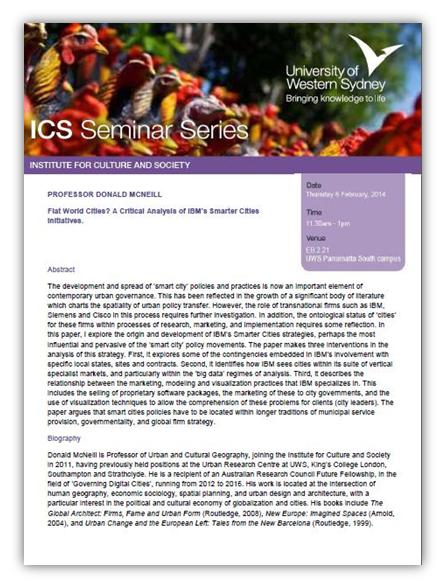ICS Seminar Series - Dr Juan Francisco Salazar and Professor Sarah Pink
Date: Thursday 4 September, 2014
Time: 11.30am - 1pm
Venue: EB.2.21, UWS Parramatta South campus
Dr Juan Francisco Salazar and Professor Sarah Pink
The Future Orientation [Techniques for Researching the Future]
Abstract
In recent years across the humanities and social sciences new interests have emerged in researching, anticipating and critically engaging futures. These interests have developed in the context of a configuration of related 'turns' that are part of international scholarship, including the growing impact agenda, the urge towards interdisciplinarity and an empirical concern with, for instance, the predictive and anticipatory modes of new technologies, forms of governance and planning, and the influence of design paradigms. Less attention however has been paid to the question of how such futures-oriented engaged scholarship will create impact in the world, what kinds of methodologies are suited to it and how its interdisciplinarity might be achieved. In this seminar we explore this context by examining the methodologies, techniques and dispositions that would be needed to underpin a move towards impact through an interdisciplinary and future-focused engaged scholarship. We draw on examples of how future-focused ethnographic scholarship might be engaged in interdisciplinary future-making projects, both from our own projects and in reporting on our recent lab around future ethnographies with colleagues from across Europe and the US.
Biographies
Juan Francisco Salazar is an anthropologist and media scholar/practitioner. He currently holds a Senior Lecturer position in Communication and Media Studies at the School of Humanities and Communication Arts and has been a member of the Institute for Culture and Society since 2006.
Sarah Pink is a Professor working across the Design Research Institute and the School of Media and Communication at RMIT. Her work is usually interdisciplinary and international and she also holds Professorships in Social Sciences and Applied Cultural Analysis at Loughborough University (UK) and Halmstad University (Sweden) respectively. Sarah is a global authority on digital visual and sensory ethnography methodologies and her work is often developed through collaborations across design, engineering and arts disciplines to which she brings social and cultural research and intervention expertise. She has published around 15 books and 120 journal articles and book chapters.





